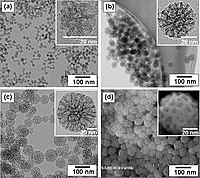
Photo from wikipedia
This study addresses the effect of hydrophobic silica nanoparticles (SiNPs) on methane hydrate formation in water-in-decane emulsions. Even though the new concept of hydrophobic particle inhibitors has been proposed in… Click to show full abstract
This study addresses the effect of hydrophobic silica nanoparticles (SiNPs) on methane hydrate formation in water-in-decane emulsions. Even though the new concept of hydrophobic particle inhibitors has been proposed in the flat interface of oil and bulk water phases, the mechanism of the particle inhibition has not been investigated for a hydrate-forming emulsion system. Numerous experiments with various amounts of SiNPs applied to water-in-decane emulsions and different temperature and pressure profiles have verified how the nanoparticles interact at the interface for hydrate inhibition or promotion. At lower concentrations of SiNPs, they act as a hydrate inhibitor. However, as the amount of SiNPs increases beyond a certain concentration (0.5 wt %), the formation rate anomalously increases because the oil film of the emulsions containing methane becomes thicker with the increasing amount of SiNPs, and water molecules form capillary bridges along the nanoparticle alignment. Our experimental results and su...
Journal Title: Energy & Fuels
Year Published: 2018
Link to full text (if available)
Share on Social Media: Sign Up to like & get
recommendations!